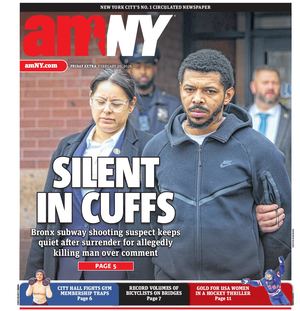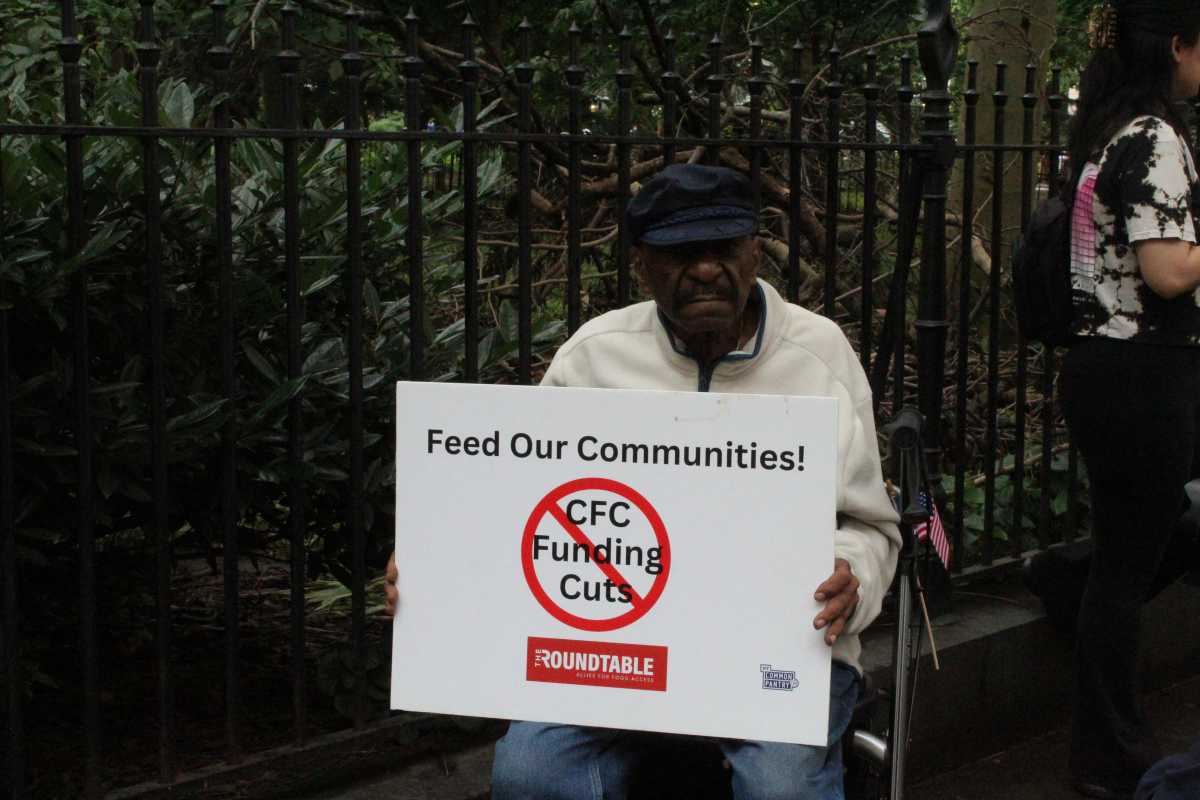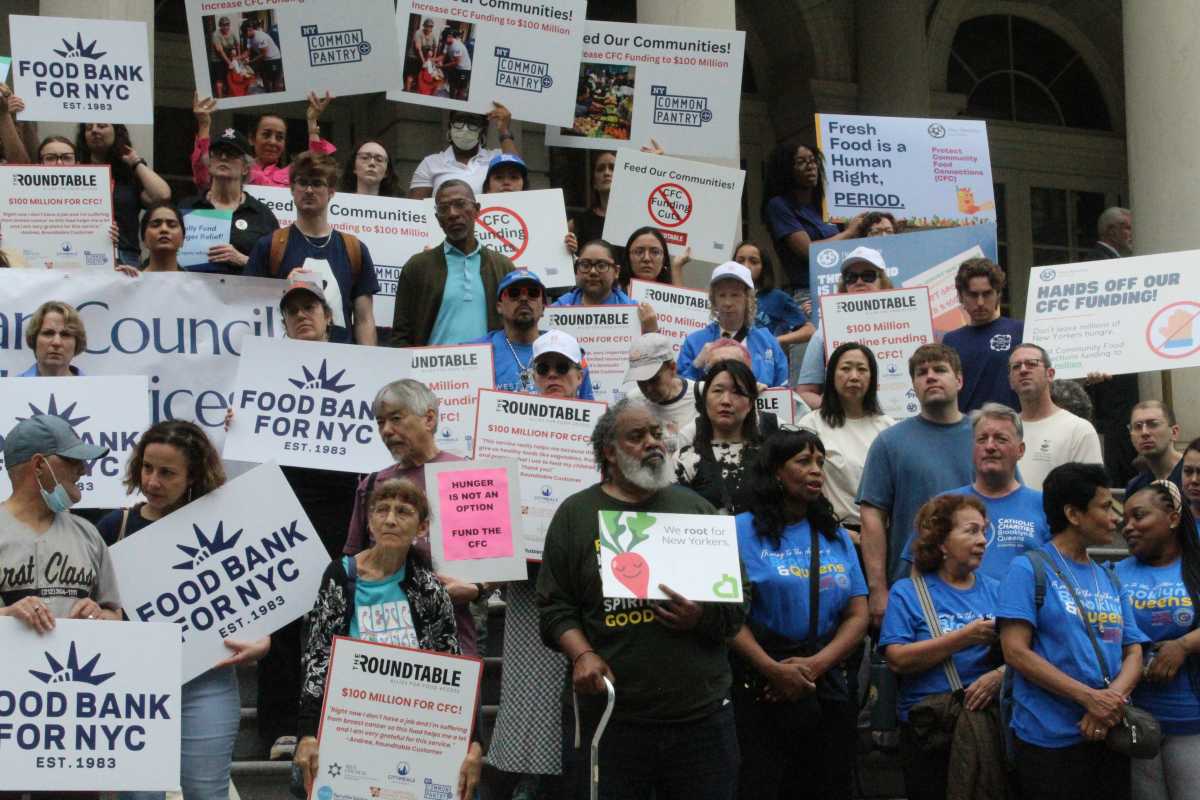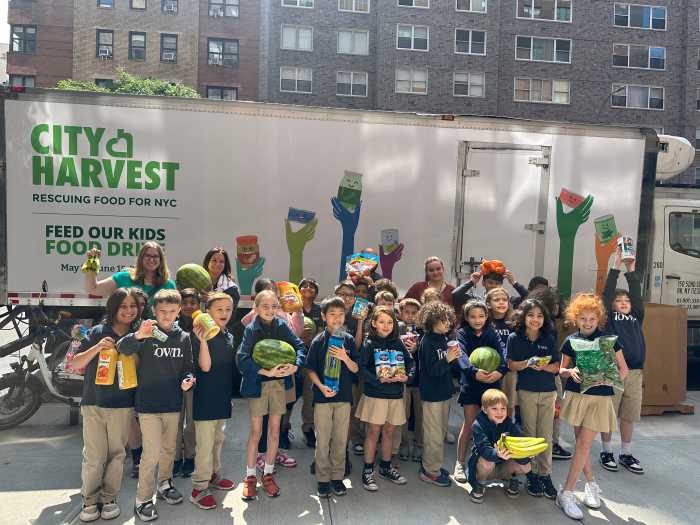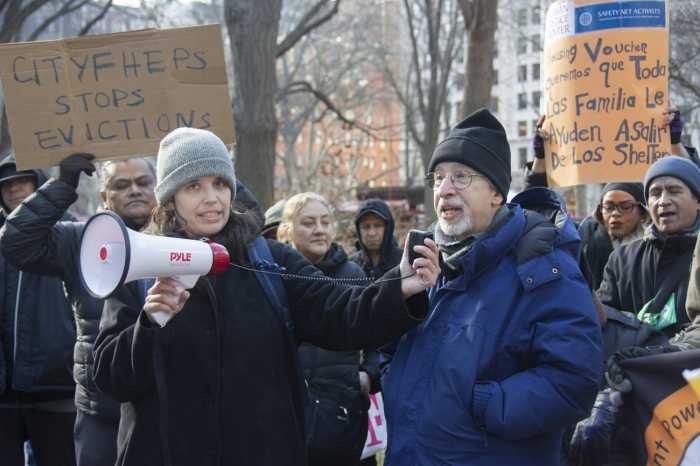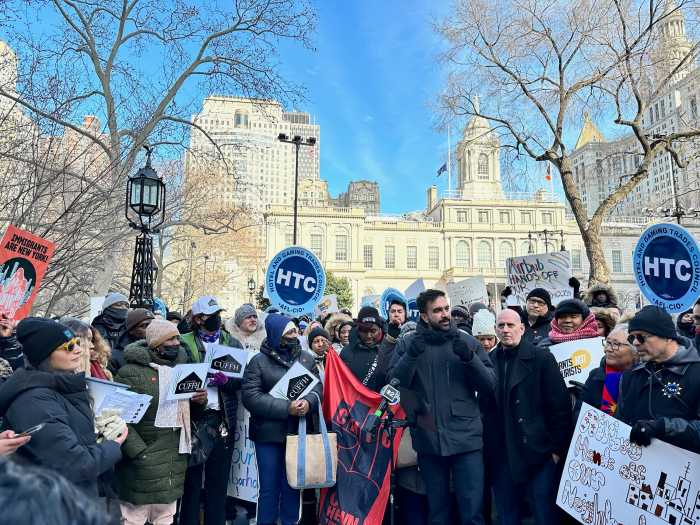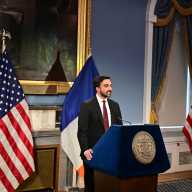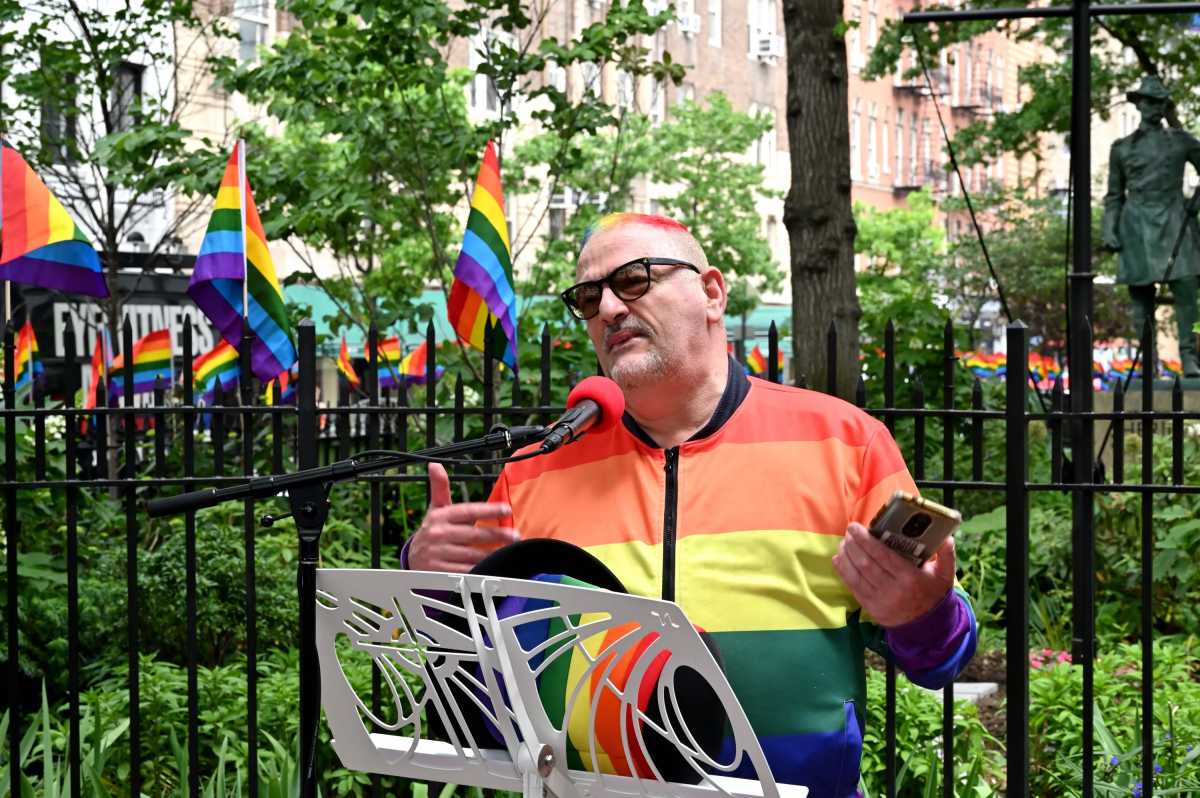Hunger relief organizations and anti-hunger advocates rallied on the steps of City Hall last week calling on Mayor Eric Adams to fully fund the Community Food Connections program at $100 million. The demand comes as food insecurity reaches alarming levels across New York City.
Organized by the Food Bank for New York City, the rally drew over 50 participants who stood outside for more than an hour holding posters that read “Fresh food is a human right,” “Food Bank for NYC,” and “Feed our communities.” Chants like “Hear our plea–increase CFC,”
“Fight, fight, fight–food is a human right,” and “Funding now” echoed on the steps of City Hall.
Participants at the June 18 rally heard from nonprofit leaders, volunteers, public servants, and New Yorkers who rely on food assistance programs. Together, they called attention to the growing hunger crisis in the city and the urgent need for government support.
Among the speakers was Jilly Stephens, CEO of City Harvest, who emphasized the city’s increasing demand for food pantries.
“Visits to soup kitchens and food pantries across the city are at the highest level on record,” said Stephens. “In 2019, there were about 25 million visits to food pantries and soup kitchens across the city. Last year, there were more than 46 million visits to those same organizations.”
Stephens also cited data by Feeding America, showing that one in six New Yorkers is experiencing food insecurity, up from one in seven the year before and one in eight in 2019.
Grace Bonilla, Chief Executive Officer at United Way of New York City, also referred to the report, which revealed that 17% of New York City residents experienced food insecurity in 2023.
“This is not a surprise,” said Bonilla.
Bonilla and others also warned about a recent House reconciliation bill that proposes the largest cuts to the Supplemental Nutrition Assistance Program (SNAP) in U.S. history. The bill would cut nearly $300 billion from the program, which helps low- and no-income individuals access food.
“New York City is on the brink of a hunger crisis, not because of the lack of food security organizations, but because the social safety net is unraveling beneath us while Washington negotiates,” said Bonilla.
Jason Cone, founder and leader of Robin Hood’s Public Policy team, issued a similar warning. “We’re here today because the storm is on the horizon,” he said, urging the mayor and city council to increase CFC funding to $100 million on behalf of Robin Hood and other nonprofits.
Currently, CFC funding stands at $50 million—just a fraction of Mayor Adams’ $115.1 billion budget.
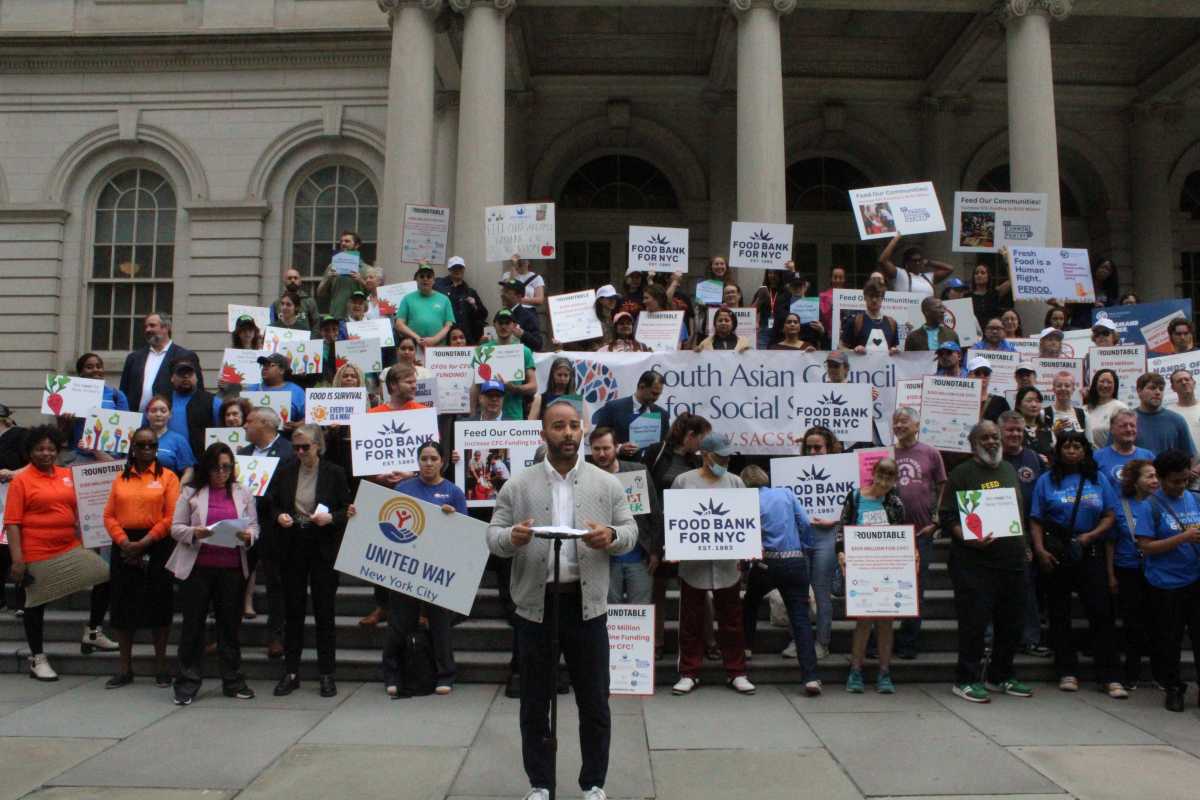
Adams admin to maintain funding
City Hall defended the allocation in a statement, noting that the administration has doubled funding for Community Food Connections since 2022 and plans to maintain the $50 million investment for the next two years.
“Our food assistance programs play a vital role in ensuring that New Yorkers in need have access to fresh and healthy food,” the statement read.
The administration also highlighted broader efforts to support low-income New Yorkers, including expanded access to rental assistance vouchers, record levels of affordable housing production, and the growth of the Fair Fares program.
“We continue to closely monitor ongoing needs as we work with our city partners and key stakeholders to ensure we are adequately funding the program moving forward,” the statement added.
Speakers stressed that the $100 million figure was not arbitrary.
“It is not a random number on a spreadsheet,” said Bonilla. “This is about dignity and meeting the moment, about making sure that no parent goes to bed worried that they can’t feed their child, about making sure that our pantries can make their door keep their doors open, the refrigerator stops and their lines move.”
Leslie Gordon, Chief Executive Officer of the Food Bank for New York City, reinforced the call for CFC funding.
“CFC critically fills in the gaps where federal and state programs fall short, and now the mayor may widen that gap,” said Gordon. “We can’t, and we won’t let that happen.”
Romero Torres, a 73-year-old native New Yorker who depends on food programs such as SNAP and Social Security, was also among the speakers. These programs “help me go forward,” said Torres.
Torres described food pantry workers and rally organizers as his lifeline.
“These people behind me, they support me, and I need to support them by having a voice here today,” said Torres. “Mayor Adams, do not cut us out. We ain’t going nowhere.”

Alex Hughes, a member of Project Hospitality, urged city officials to see the issue as a nonpartisan one.
“We’re here today with a message that should not be a political one. Food is a human right,” Hughes said. “Snap is being cut. The largest cut in the program’s history is being proposed. We need the city to help fill the gap.”
Hughes described seeing parents push their children along in their empty grocery carts and waiting in the pantry line with kids in the car. “Mr. Mayor, believe the evidence of your eyes and your ears, and the hunger crisis is getting worse.”
The final speaker at the rally was Joan Benefiel, Director of the Greenpoint Hunger Program, who underscored the consequences of food insecurity. “A hungry city is not a safe city,” said Benefiel.
Benefiel described how hunger leaves communities vulnerable to rising mental health struggles, including depression and anxiety, and how it hinders children’s ability to focus in school due to lack of proper nutrition.
“That is not New York,” said Benefiel.
